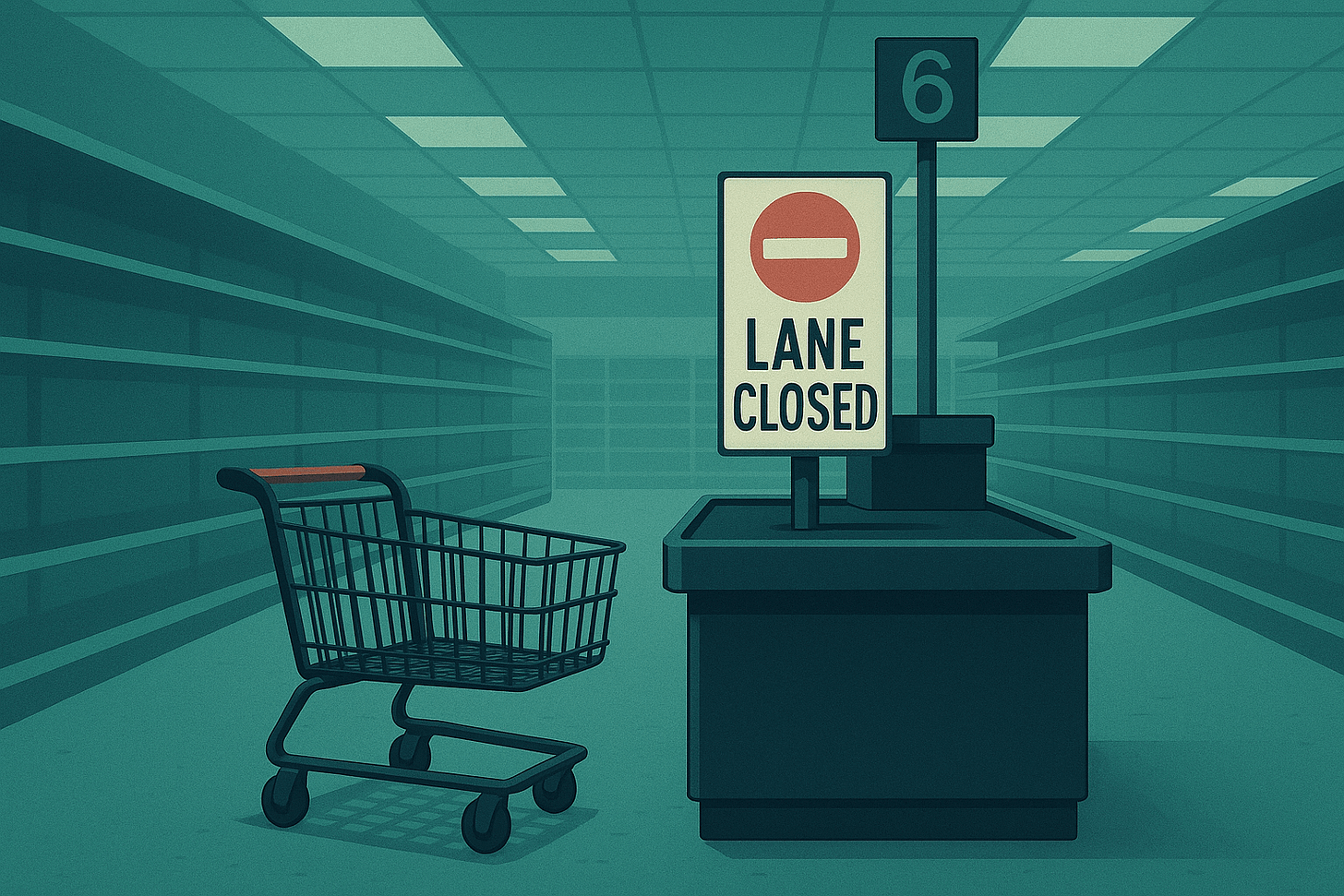Freedom Died in the Checkout Line
How efficiency, fear, and central planning turned convenience into control.
People love convenience almost as much as they love pretending it’s freedom.
Every empire that forgot the difference had to rediscover it the hard way.
Imagine a nation with one great grocery store. Efficient, well‑lit, stacked to the ceiling. It sells food, medication, and even gasoline through its own super-sized gas station. The government calls this progress: lower costs, better inventory control, no duplication of effort.
And it is progress, until the day the store closes.
A trucker strike, a power failure, a few bad decisions in a boardroom miles away, and the shelves go empty. By the second day, the cheerful slogans about “efficiency” start to sound less comforting.
That is centralization in practice. It works perfectly right up to the moment it doesn’t.
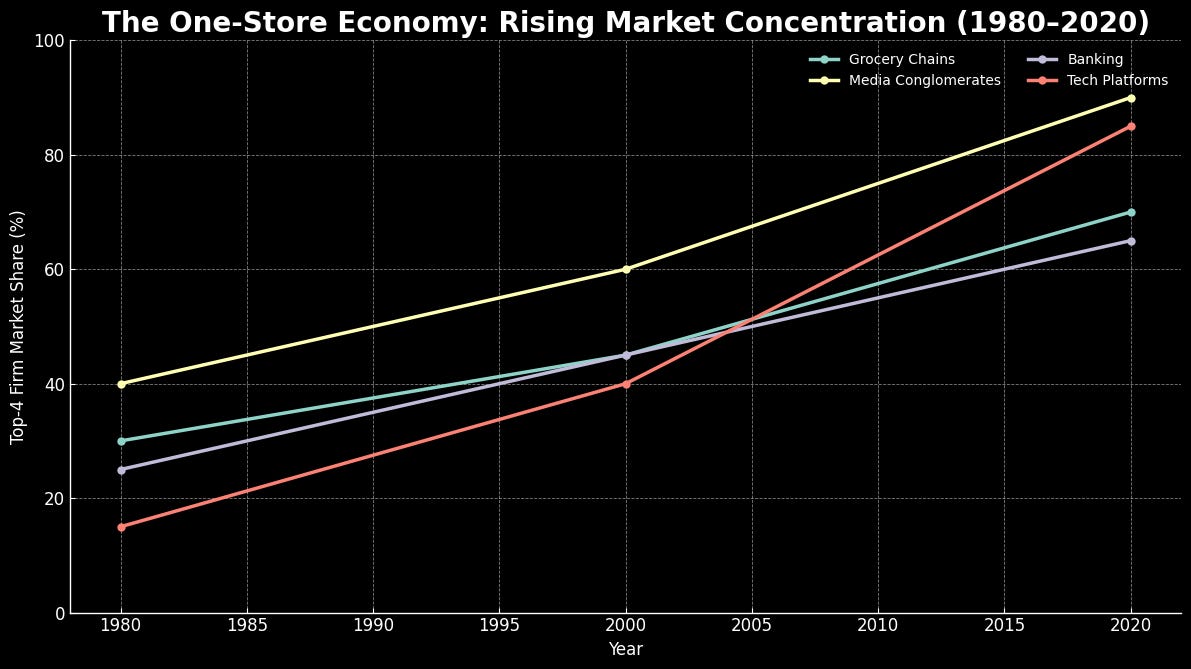
From Groceries to Everything
A century of “modernization” has turned nearly every sector into that single store.
The grocery chains killed the corner markets.
The financial sector merged until ten banks became four.
The press consolidated into a handful of conglomerates.
Information flowed the way bread used to: from a few central bakeries to millions of dependents.
What we gained in price and polish we lost in resilience. A system with one supplier doesn’t need malice to become dangerous; it only needs a mistake.
The pandemic made that arithmetic visible. When three meat‑packing plants closed in 2020, nearly 30 percent of the entire nation’s pork supply disappeared within a week. The same “lean logistics” that keep prices low ensure hunger when those few nodes fail.
Centralization is efficiency’s dark twin.
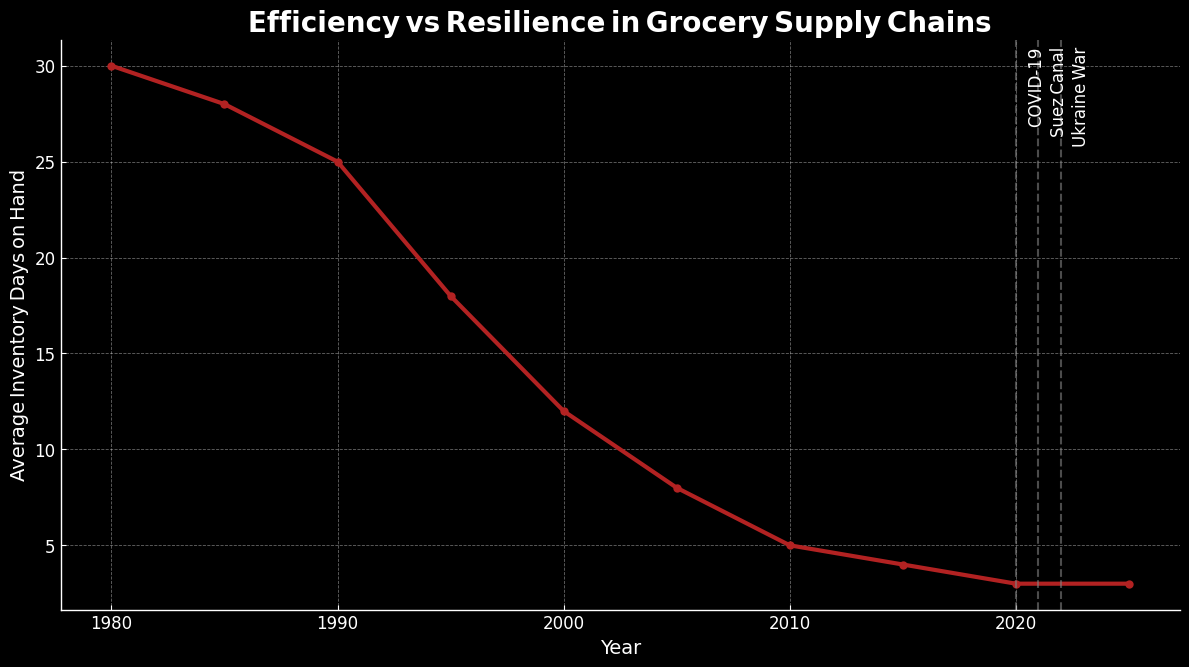
The New York Experiment
Central planning didn’t retire; it just re‑entered the chat under a new name.
New York City has decided to test it again.
The city’s newly elected mayor, Zohran Mamdani, rode into office on a program that might have been drafted in a 1970s economics seminar: freeze rents, make buses free, create a new Department of Community Safety, guarantee childcare for every household, and, at the center of it, build a chain of city‑owned grocery stores.
The pitch names it a “public option for food.” The copy promises wholesale purchasing, centralized warehousing, and price caps, all the features that economists once used to diagnose a shortage before it happened. The talking point is familiar: lower costs by removing profit. The outcome has been familiar too, from Britain’s coal mines to Venezuela’s supermarkets.
Add to this a 2 percent surtax on New York’s highest earners, an 11.5 percent corporate rate to “match New Jersey,” and a pledge to triple public‑sector housing. In effect, the nation’s most expensive city just elected a government committed to owning its own economy.
Even CNN saw the tone change. On election night, commentator Van Jones described Mamdani’s victory speech as a “character switch”, the calm, digital‑age reformer suddenly replaced by what he called a “rage‑filled class warrior.” The candidate who had promised dignity at the register shouted that his 50‑percent win was a mandate for a new kind of politics. Within hours the mask of compromise gave way to the muscle memory of ideology.
That’s the part that matters. Rhetoric about fairness always lasts right up to the moment someone hands you the keys to the store.
And once government runs the checkout line, every transaction becomes a political act. If City Hall sets the food prices, it also sets the menu.
The math doesn’t change just because the motives do.
A state‑run grocery chain doesn’t eliminate profit; it redirects it.
When City Hall covers its own rent and taxes with public money, private grocers disappear, and “affordable food” becomes whatever the city budget can bear that month. Price freezes become rationing. Subsidies become shortages. New Yorkers will soon learn what every planned economy learns: you can vote yourself into dependence, but you have to work your way out.
The Pipeline of Information
In 1950, America had more than 1,700 independently owned daily newspapers. Today, five chains own about two‑thirds of what’s left. Add that to six entertainment conglomerates and two digital gatekeepers — Google and Meta — and you have a bottleneck disguised as diversity.
When Facebook altered an algorithm in 2018, traffic to small publishers collapsed by half overnight. No censors, no tanks, just code. People who believed they lived in an age of unlimited choice discovered they’d been shopping in one store all along.
It isn’t new. The Soviet Union rationed ideology the same way it rationed meat.
The West learned to do it with branding.
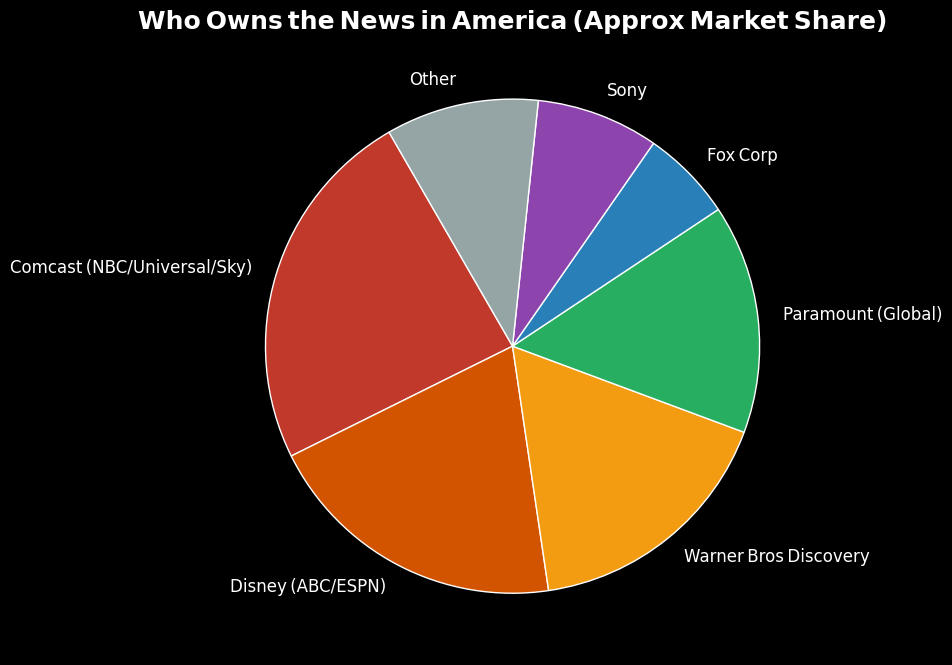
The Political Monopoly
Democrats understood decades ago that success requires infrastructure, not inspiration.
They built universities, unions, foundations, and nonprofits that keep language, funding, and culture in sync. When one outlet falters, another repeats the line within hours.
Conservatives built celebrities.
You can replace a researcher; you can’t replace a brand overnight. Hence the steady pattern: the Left loses elections but keeps the culture. The Right wins elections and wonders why the culture never changes.
Every “movement” built around one talk‑show host or one platform is a sandcastle at high tide. You can admire the design, but you’d be better off not living in it.
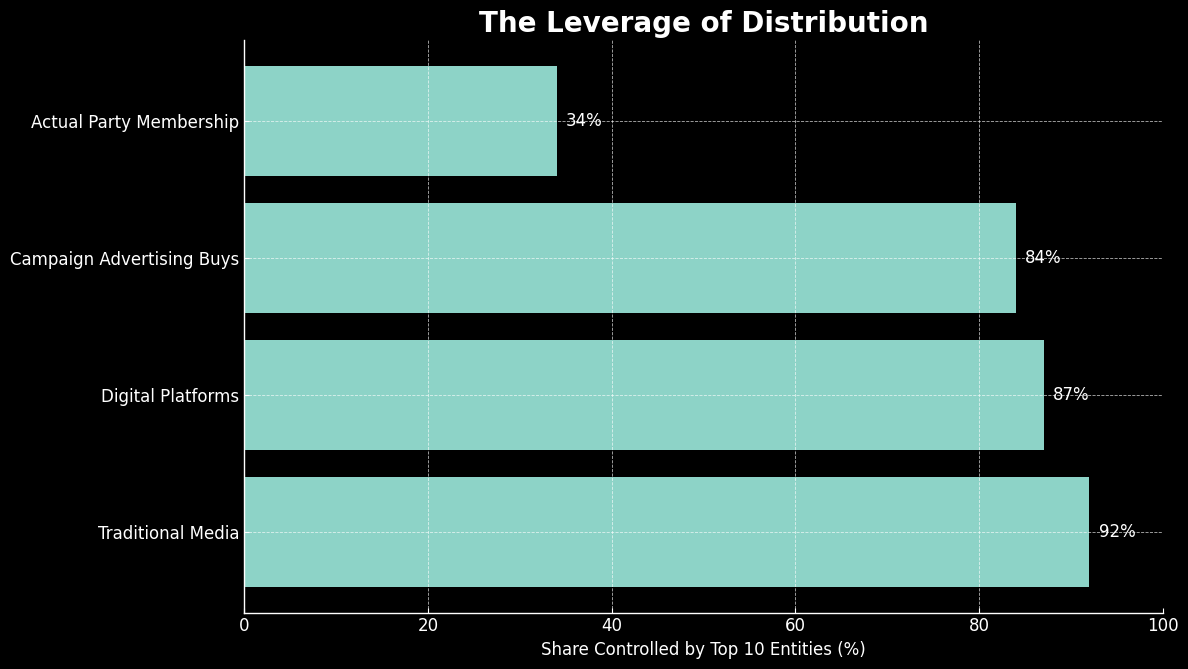
When the Store Shuts Down for Real
Look north.
In early 2022, Canadian truckers protesting vaccine mandates parked their rigs across Ottawa. They wanted to cross the border without proving obedience to the jab decree that had already lost its medical justification. The protest stayed mostly peaceful, with horns, banners, and diesel fumes, which were very inconvenient for people in charge.
Prime Minister Justin Trudeau didn’t negotiate. He invoked the Emergencies Act, something no government had ever used during peacetime. Overnight, banks received lists of names from the national police. Accounts were frozen; no warrant, no trial, sometimes no charge.
Some of the frozen were simply donors. One woman whose only “crime” was sending $50 through an online fundraiser woke to find herself locked out of her life savings.
Western journalists shrugged.
If they had possessed a functioning memory, they might have recognized the pattern: every command economy ends by weaponizing access.
The truckers learned that existence in a digital banking system is a privilege, not a right.
The rest of us learned how quickly “liberal democracy” can skip the legal process when citizens stop obeying the store manager.
The American Version
Washington watched all this with approval.
By the time the Biden administration took power in January 2021, it had already accepted the same logic: safety first, liberty negotiable.
The White House began with executive orders framed as workplace hygiene. Within months they became federal vaccine mandates.
By August, Defense Secretary Lloyd Austin announced that all 1.4 million active‑duty servicemembers would take the shot or face disciplinary action. The timing was convenient: Pfizer had just received formal FDA approval.
Religious exemptions? Denied.
Natural immunity? Irrelevant.
Over the next year, more than 8,000 servicemembers were discharged, many with spotless records.
Recruitment collapsed to levels not seen since the post‑Vietnam era; units lost specialists faster than they could train replacements.
The people who cheered “support our troops” during every campaign became remarkably silent when those same troops asked for bodily autonomy.
Almost simultaneously, the administration moved on the private economy.
On September 9, 2021, President Biden announced a plan that covered roughly 100 million workers.
Federal contractors, any company touching so much as a Defense Department sub‑grant, had to guarantee that their employees were vaccinated. Hospitals funded through Medicare or Medicaid (which means nearly every hospital) faced the same demand.
And through the Occupational Safety and Health Administration, the White House attempted to make vaccination mandatory in every private company with more than 100 employees. The legal term was “Emergency Temporary Standard,” but nothing about it was temporary.
The Supreme Court struck that rule down in early 2022, but the damage was done.
Corporations, fearful of losing federal contracts, enforced the policy before the ruling arrived.
Tens of thousands of workers either quit or were fired.
Some tried to sue. Few could afford it.
Bureaucrats didn’t need to pass a law; they just squeezed the pipelines.
If you worked, studied, or served under a system dependent on federal approval, the decision had already been made for you. The store was closed to the unvaccinated.
Efficiency With a Gun to Its Head
This was sold as science, but it was logistics. The government discovered that controlling access to work, travel, and payment systems produced faster obedience than any statute. Canada’s emergency order taught Washington the trick; Washington refined it.
When power joins hands with corporations, soft tyranny becomes safer than open debate.
During that same window, Americans also learned how the technology sector could delete stories that embarrassed its allies.
The New York Post’s Hunter Biden laptop story, authenticated later even by opponents, was blocked by Twitter weeks before the 2020 election. Facebook “limited” its reach. Search engines buried it. Afterward, intelligence officials congratulated themselves for protecting the public from “disinformation.”
That isn’t rumor; it’s a line from congressional testimony.
If one superstore can shut down the news that threatens its shareholders, how many stores do you think we actually own?
The Mathematics of Fragility
Economists used to talk about creative destruction. We’ve modernized the first part and forgotten the second.
There is no creation without redundancy.
Every market, every democracy, every military depends on a margin for error, a little slack in the rope.
The Federal Reserve learned the same lesson in 2008.
Decades of consolidation produced a finance sector so “streamlined” that a handful of banks could nearly sink the world. Their bailouts cost trillions.
The people who warned against concentration were ignored because they sounded repetitive. Repetition, unfortunately, is how you stay alive.
Centralization trades resilience for appearance. The grocery store model looks modern until the truck doesn’t arrive.
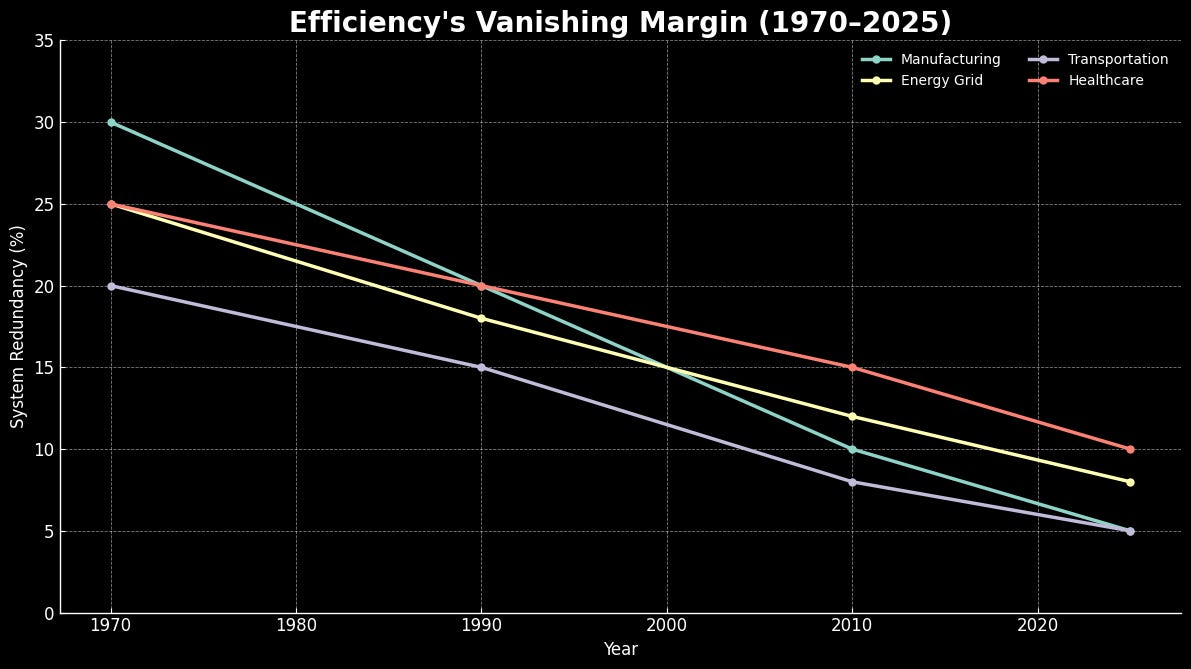
Media and Markets Share the Same DNA
In business, when one supplier controls the raw materials, it’s called monopoly.
In journalism, we call it “trust.”
Different label, same economics.
Half a century ago, a newsroom could lose advertisers but keep readers. The subscriber wrote the check directly. Today most digital outlets rely on ad brokers, Google for sales, Amazon Web Services for hosting, two social networks for traffic. If any one of those turns hostile, independence ends with a polite terms‑of‑service notice.
Freedom of speech isn’t about what you’re allowed to say. It’s about whether you can still earn a living after you’ve said it.
The Market Solution We Keep Ignoring
The cure exists and doesn’t require a constitutional convention: competition.
Decentralization is capitalism’s natural state and tyranny’s natural enemy.
It’s happening anyway, quietly.
Substack reached more than twenty million readers by 2024. Writers there make their living exactly the way newspaper boys did a century ago, one reader, one payment, no middleman.
Rumble, dismissed as a political vanity project, grew to sixty million active users precisely because YouTube tried to curate thought.
Podcasts, funded directly by listeners, now claim a larger share of public attention than network radio ever had. It’s messy, uneven, sometimes petty, and that’s the beauty of it. Pluralism often appears chaotic from a distance.
The state can’t censor what it can’t coordinate.
The Political Arithmetic Ahead
None of this should surprise anyone who remembers basic economics: incentives work.
Reward conformity with contracts and punish independence with exclusion, and soon every major corporation will behave like a subsidiary of government.
You don’t need to nationalize an industry when fear does the bookkeeping for you.
The cost comes later. A public fed on one set of assumptions loses the ability to question any of them.
By 2025, major pollsters found that nearly two‑thirds of Americans no longer trusted national news yet still consumed it daily. Dependency without faith, that’s the ultimate sign of monopoly power.
What Real Competition Looks Like
The same principles that built American prosperity can rebuild cultural independence.
Start small.
Local papers, independent podcasts, community think tanks; boring, humble work done by people who expect no applause.
If costs rise, share them. If the government leans, stand together.
Five hundred medium‑sized outlets can survive what one giant cannot.
Freedom of information doesn’t require perfection; it requires redundancy.
It’s the same reason airplanes fly with two engines and nuclear reactors use parallel cooling loops. When failure means death, you never trust a single system.
The Real Trade‑Off
Sowell spent decades reminding readers that there are no solutions, only trade‑offs.
Centralization offers lower prices and higher risk.
Decentralization offers higher costs and actual freedom.
Which do we value more, cheap commodities or durable liberty?
Anyone who lived through the 2020s already knows the answer. Canadians learned it when they couldn’t withdraw money. Soldiers learned it when their careers ended for refusing a pharmaceutical order. Americans learned it when they couldn’t keep a job without scanning a QR code.
Every one of those situations was defended as “temporary.” The word 'temporary' has eroded more rights than any dictator could dream of.
What We Owe Ourselves
You rebuild independence the same way any market rebuilds after a monopoly, by withdrawing permission. Buy directly, read directly, fund directly.
When you find a creator, a business, or a neighbor who still acts like an owner, please support them. That’s civic hygiene, the democratic version of diversified investment.
Because the next time the store closes, and it will, you’ll want to remember how to grow your own food.
Freedom isn’t a slogan. It’s the work nobody wants to do until the shelves are bare.
WE NEED TO STAND TOGETHER!
Rebuild Independence Before the Store Closes
We are living inside a system that only works as long as its managers allow it. When banks freeze accounts, platforms shadow-ban voices, and corporations decide what can be said, we are no longer citizens — we are customers of a monopoly that calls itself democracy.
If we do not build the replacement infrastructure now, the shelves will go bare when it fails. This is how we fight back. It needs fuel.
Become a Paid Subscriber
Eight dollars a month keeps the signal alive and the servers running. It funds research, editing, charts, and outreach that strengthen independent distribution — the kind no government or corporation can shut off.
This is not about access. It is about resilience and continuity.
Join here: https://mrchr.is/help
Make a One-Time Gift
If subscriptions aren’t your style, a direct gift powers the hard costs that keep the network running — tools, data, hosting, security, and the quiet infrastructure that makes independence possible.
Give here: https://mrchr.is/give
Join The Resistance Core
Founding backers fund the architecture of survival. Your support anchors public tools that track coordination, amplify independent creators, and build redundancy where central control used to be.
Founders are thanked on the site and invited to private project updates.
Become a Founder: https://mrchr.is/resist
What Your Support Builds Right Now
A public, share-ready archive of independent journalism and source data
Weekly briefs with charts, verified citations, and clean links for distribution
Metrics that track reach and replication across alternative platforms
Outreach to creators and small outlets to decentralize communication
Secure hosting and moderation so the work stays online when others vanish
If You Cannot Give
You can still fortify the network.
Adopt the three-share habit this week — one hour, three creators who still believe in citizenship over control.
Explain why in one sentence. Post one clean link.
The voice you strengthen today may be the one that steadies the country when the store closes again.


